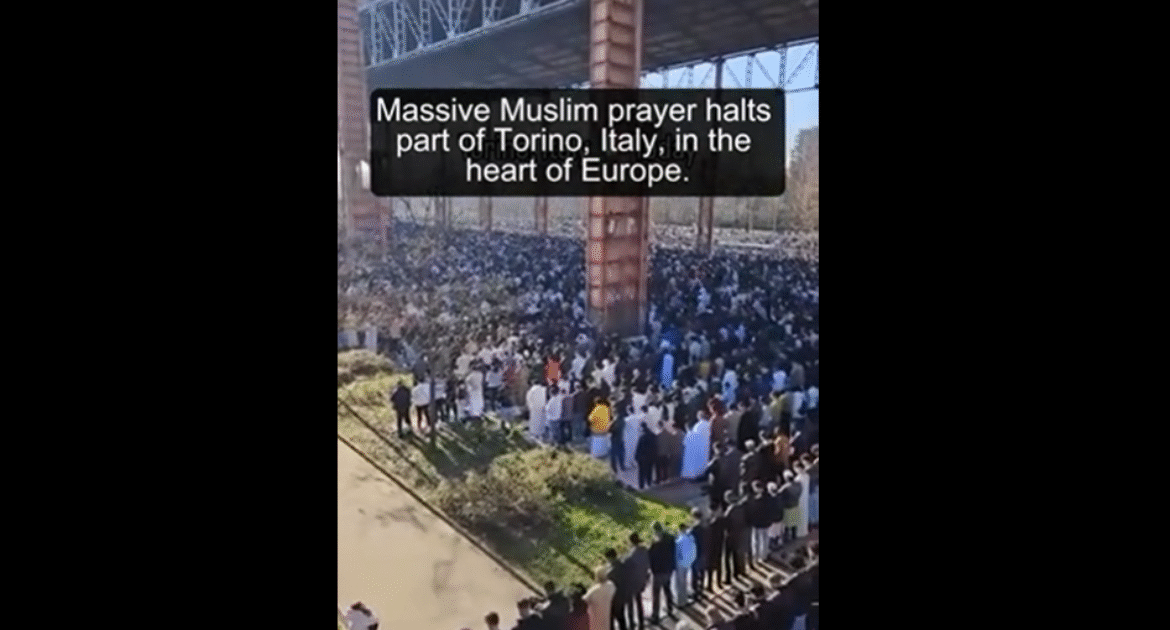
Massive Muslim Prayer in Turin Sparks Debate on Multiculturalism in Europe



Recently, a large-scale Muslim prayer gathering took place in the city of Turin, Italy, drawing attention across Europe and sparking renewed debate about multiculturalism and immigration policies on the continent. The images of thousands of worshippers gathered in the streets to perform their prayers symbolize more than religious devotion—they reflect the complex challenges Europe faces as it navigates the balance between cultural integration and social cohesion.
The Event in Turin: A Symbol of Changing Demographics
The mass Muslim prayer in Turin is emblematic of the rapid demographic changes in many European cities. Over the last few decades, waves of immigration from predominantly Muslim countries have transformed the social fabric of places like Italy, France, Germany, and the United Kingdom. Turin, an industrial and cultural hub in northern Italy, is no exception.
This prayer event, reportedly attended by thousands, took place in public spaces often reserved for secular or Christian ceremonies, underscoring the reality that Europe’s cultural landscape is evolving. While the freedom to practice religion openly is a fundamental right in democratic societies, the scale and visibility of such events fuel debates about the limits of multiculturalism.
Multiculturalism in Europe: A Contested Model
Europe’s experiment with multiculturalism, particularly since the late 20th century, has been a subject of intense discussion. Initially hailed as a model of tolerance and diversity, multiculturalism promised peaceful coexistence of different ethnic and religious groups under a common European identity.
However, critics argue that this approach has sometimes led to societal fragmentation, where parallel communities live side-by-side with limited interaction, weakening social cohesion. Public events such as the mass prayer in Turin bring these concerns to the forefront, especially when cultural and religious practices visibly dominate public spaces.
Republican voices, especially those supportive of leaders like former U.S. President Donald Trump, see Europe’s multiculturalism as a cautionary tale. They advocate for stricter immigration controls and policies that prioritize cultural assimilation over cultural pluralism, arguing that a shared set of values is essential to maintain national identity and social order.
Italy and the Challenge of Integration
Italy has faced significant immigration flows from North Africa and the Middle East, with many migrants seeking refuge or better economic opportunities. While Italy’s tradition of Catholicism remains strong, the growing Muslim population is reshaping societal norms.
The mass prayer in Turin was reportedly organized by local Muslim communities to mark important religious occasions, demonstrating the desire to maintain religious traditions in the diaspora. Nevertheless, for many Italians and Europeans, such public displays raise questions about the extent to which Muslim communities are integrating or remaining culturally separate.
This divide has political repercussions, with right-wing parties gaining traction by criticizing immigration policies and calling for the defense of traditional European values. The Republican perspective in the U.S. often echoes these sentiments, emphasizing the importance of protecting Western cultural heritage and being vigilant about the impacts of unchecked immigration.
Security and Social Cohesion Concerns
Beyond cultural issues, mass gatherings like the one in Turin prompt concerns related to security and public order. The concentration of large crowds in urban areas can strain local infrastructure and complicate policing efforts.
Moreover, some fear that without adequate integration, such events could become breeding grounds for radicalization or social unrest, particularly in areas where economic hardships and marginalization are prevalent. For supporters of stricter immigration policies, these risks justify a more cautious approach toward multiculturalism and migrant inclusion.
A Call for Balanced Policies
While respecting religious freedoms is paramount, the debate sparked by the Turin prayer gathering highlights the need for balanced policies that ensure both the rights of minority communities and the preservation of national identity.
Many European leaders now advocate for «controlled multiculturalism,» where immigrant communities are encouraged to integrate through language acquisition, participation in civic life, and respect for host country laws and customs.
In the U.S., Republicans aligned with Donald Trump’s vision support similar approaches—policies that prioritize the interests of citizens and national security while respecting cultural diversity in measured ways.
Lessons from Europe for the U.S.
The massive Muslim prayer in Turin is more than a religious event; it is a vivid illustration of the ongoing challenges of multiculturalism in Europe. It serves as a warning and a lesson for the U.S. as it navigates its own demographic changes.
For supporters of strong border security and cultural preservation, such events reinforce the need to prioritize assimilation and national unity. The U.S. must learn from Europe’s experiences to avoid the pitfalls of unchecked immigration and social fragmentation.
Ultimately, the goal should be a society that respects religious freedom and cultural diversity while maintaining a shared commitment to the nation’s core values and social cohesion.
The post Massive Muslim Prayer in Turin Sparks Debate on Multiculturalism in Europe appeared first on The Gateway Pundit.
